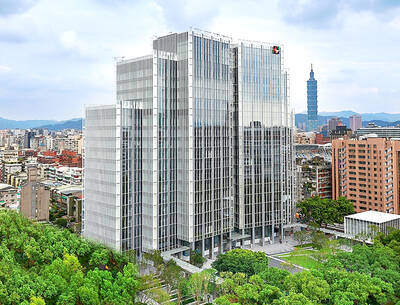The EU imposed tariffs on polyester fibers from Taiwan and Malaysia to protect EU producers including Ireland's Wellman International Ltd and Spain's La Seda de Barcelona SA from cheaper imports.
The duties punish Taiwanese and Malaysian exporters of polyester staple fibers for dumping in Europe's 1.2 billion euro (US$1.6 billion) market. The duties are as high as 29.5 percent for Taiwan and 23 percent for Malaysia.
EU polyester fiber manufacturers suffered "material injury" as a result of dumped imports from Taiwan and Malaysia, the European Commission said in the Official Journal on Thursday. The duties took effect yesterday, will last six months and may be prolonged for five years.
The 25-nation EU is seeking to balance the interests of European producers and buyers of polyester staple fibers, which are used in clothes, bed linen and furniture fillings. Two months ago, the bloc scrapped anti-dumping duties on the product from India, Indonesia, Thailand and Australia while leaving in place levies against China, South Korea, Saudi Arabia and Belarus.
The EU had imposed anti-dumping duties on polyester staple fibers from Taiwan until March last year, when the bloc ended the measures after finding that dumping by Taiwanese exporters, including Nan Ya Plastics Corp (南亞塑膠) and Far Eastern Textile Ltd (遠東紡織), had become too limited to justify the trade protection.
Taiwanese and Malaysian exporters doubled their combined share of the EU market to about 15 percent last year compared with 2002, hurting the sales and market share of the EU industry, the commission said.

UNCERTAINTY: Investors remain worried that trade negotiations with Washington could go poorly, given Trump’s inconsistency on tariffs in his second term, experts said The consumer confidence index this month fell for a ninth consecutive month to its lowest level in 13 months, as global trade uncertainties and tariff risks cloud Taiwan’s economic outlook, a survey released yesterday by National Central University found. The biggest decline came from the timing for stock investments, which plunged 11.82 points to 26.82, underscoring bleak investor confidence, it said. “Although the TAIEX reclaimed the 21,000-point mark after the US and China agreed to bury the hatchet for 90 days, investors remain worried that the situation would turn sour later,” said Dachrahn Wu (吳大任), director of the university’s Research Center for

Alchip Technologies Ltd (世芯), an application-specific integrated circuit (ASIC) designer specializing in artificial-intelligence (AI) chips, yesterday said that small-volume production of 3-nanometer (nm) chips for a key customer is on track to start by the end of this year, dismissing speculation about delays in producing advanced chips. As Alchip is transitioning from 7-nanometer and 5-nanometer process technology to 3 nanometers, investors and shareholders have been closely monitoring whether the company is navigating through such transition smoothly. “We are proceeding well in [building] this generation [of chips]. It appears to me that no revision will be required. We have achieved success in designing

GROWING CONCERN: Some senior Trump administration officials opposed the UAE expansion over fears that another TSMC project could jeopardize its US investment Taiwan Semiconductor Manufacturing Co (TSMC, 台積電) is evaluating building an advanced production facility in the United Arab Emirates (UAE) and has discussed the possibility with officials in US President Donald Trump’s administration, people familiar with the matter said, in a potentially major bet on the Middle East that would only come to fruition with Washington’s approval. The company has had multiple meetings in the past few months with US Special Envoy to the Middle East Steve Witkoff and officials from MGX, an influential investment vehicle overseen by the UAE president’s brother, the people said. The conversations are a continuation of talks that

PROJECTION: KGI Financial said that based on its foreign exchange exposure, a NT$0.1 increase in the New Taiwan dollar would negatively impact it by about NT$1.7 billion KGI Financial Holding Co (凱基金控) yesterday said its life insurance arm has increased hedging and adopted other moves to curb the impact of the local currency’s appreciation on its profitability. “It is difficult to accurately depict the hedging costs, which might vary from 7 percent to 40 percent in a single day,” KGI Life Insurance Co (凱基人壽) told an investors’ conference in Taipei. KGI Life, which underpinned 66 percent of the group’s total net income last year, has elevated hedging to 55 to 60 percent, while using a basket of currencies to manage currency volatility, the insurer said. As different